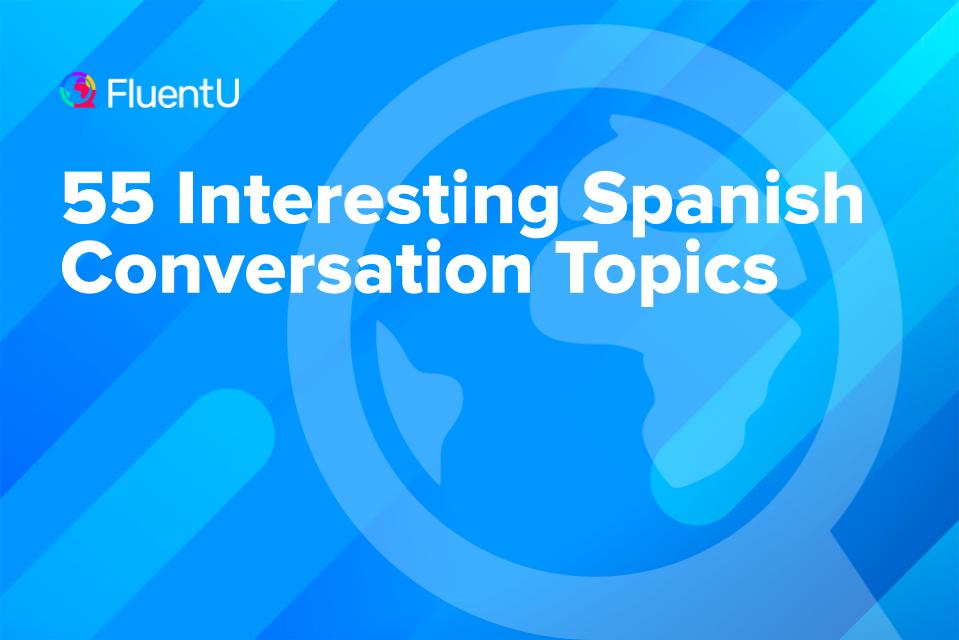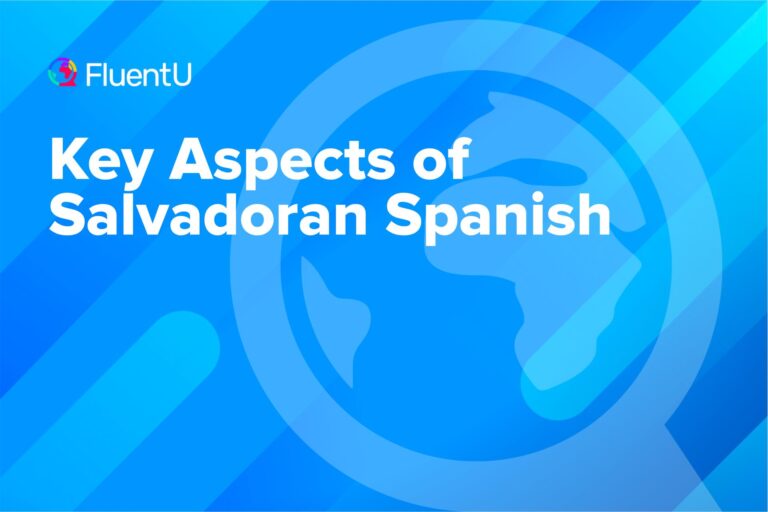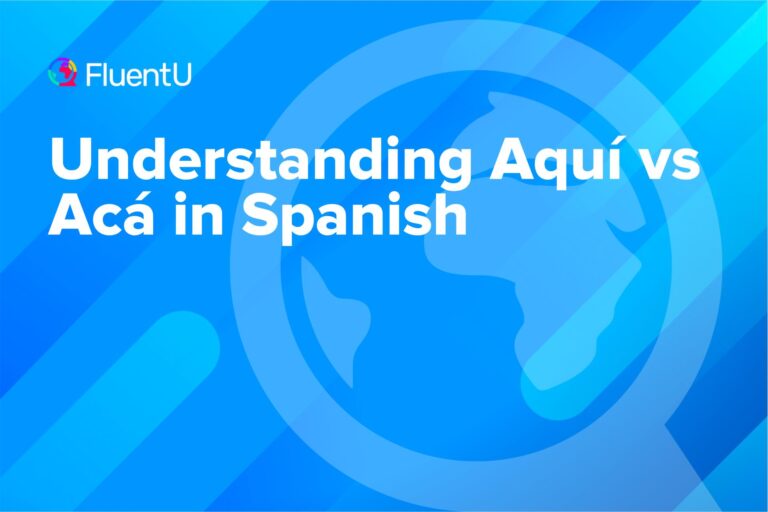55 Interesting Spanish Conversation Topics

To build your Spanish skills and grow your confidence, conversation practice is a must. Whether that’s with a native speaker, a tutor or a fellow learner, you’re going to need some interesting topics to keep the conversation flowing.
It’s important to talk about a variety of topics. That way, you’ll make sure you’re practicing lots of different verb tenses and vocabulary words. Here are some great topics to try out during your next Spanish conversation.
Download: This blog post is available as a convenient and portable PDF that you can take anywhere. Click here to get a copy. (Download)
Food and Restaurants
Who doesn’t love good food? This is a great conversation topic for beginners, and it’s one that nearly everyone can participate in. Talking about food can help you bond with new acquaintances and even learn about another culture.
In addition to working on food vocabulary, this is also a great way to practice present-tense verbs, constructions of verbs like gustar (to like) and adjectives.
Here are some questions and phrases you can use to get the conversation started:
1. ¿Cuál es tu comida favorita? — What’s your favorite food?
2. ¿Cuál es tu postre favorito? — What’s your favorite dessert?
3. ¿Cómo es la comida en tu país? — What’s the food like in your country?
4. ¿Cuáles son los platos típicos de tu país? — What are the typical dishes of your country?
5. ¿Te gusta cocinar? — Do you like to cook?
6. ¿Con qué frecuencia sales a comer? — How often do you go out to eat?
7. ¿Cuál es tu restaurante favorito en…? — What’s your favorite restaurant in…?
8. ¿Has probado…? — Have you tried…?
9. Mi comida favorita es… — My favorite food is…
10. Me gusta la comida de… — I like the food in…
Remember, after answering a question from your conversation partner, you can always turn it around by asking “Y tú?” (And you?).
Music
This is another nice, casual conversation topic that most people can participate in since almost everyone has opinions on music.
Talking about music is especially great for beginners since lots of the key vocabulary is the same as in English: Rock, pop, hip-hop, rap and so on. Here are some questions and phrases to guide your conversation about music:
11. ¿Qué tipo de música te gusta? — What type of music do you like?
12. ¿Cuál es tu banda o grupo favorito? — What’s your favorite band or group?
13. ¿Quién es tu cantante favorito? — Who’s your favorite singer?
14. ¿Tienes una canción o álbum favorito? — Do you have a favorite song or album?
15. ¿Vas a conciertos a menudo? — Do you go to concerts often?
16. ¿Qué canción te gusta cantar en el karaoke? — What song do you like to sing at karaoke?
17. ¿Qué artistas escuchabas cuando eras más joven? — What artists did you listen to when you were younger?
18. ¿Te gustaría ser un cantante o músico famoso? — Would you like to be a famous singer or musician? (Use una cantante and música famosa if you’re talking to a female.)
To talk about your favorite artists, genres, etc., you can use Me gusta… (I like…), Yo prefiero… (I prefer…) or Mi favorito es… (My favorite is…).
To agree or disagree with your conversation partner, you can use Yo también (Me too) or Yo tampoco (Me neither).
Travel
I’ve found that travel is a convenient way to connect with other language learners; many people who learn foreign languages do so because they like to travel, meet people from around the world and connect with different cultures. You can talk about past travels, future plans, dream vacations and so on.
This allows you to practice travel vocabulary and a variety of verb tenses from past to present perfect to future. You might even get some tips for your next trip! Here are some questions and phrases to guide the conversation:
19. ¿Te gusta viajar? — Do you like to travel?
20. ¿Has viajado a…? — Have you traveled to…?
21. ¿Conoces…? — Have you traveled to…?
This literally means “Do you know…?” but is a more colloquial way to ask, “¿Has viajado a…?”.
22. ¿A dónde te gustaría viajar? — Where would you like to travel?
23. ¿Prefieres viajar a ciudades o pueblos pequeños? — Do you prefer to travel to cities or small towns?
24. ¿Prefieres viajar solo, con amigos o en familia? — Do you prefer to travel alone, with friends or with family?
25. ¿Prefieres viajes aventureros o relajantes? — Do you prefer adventurous or relaxing trips?
26. ¿Qué hiciste durante tus últimas vacaciones? — What did you do during your last vacation?
27. Mi país favorito es… — My favorite country is…
Mi ciudad favorita es… — My favorite city is…
Mi lugar favorito es… — My favorite place is…
28. Me gustaría viajar a… — I would like to travel to…
29. Mi próximo viaje es… — My next trip is…
30. En mi próximo viaje voy a… — On my next trip I’m going to…
Holidays and Special Occasions
Holidays and celebrations can vary wildly from culture to culture. Even within a country or culture, people may have unique traditions for a given holiday. Talking about this can be a great way to learn about someone’s background.
Talking about traditions will require present tense verbs while inquiring about holiday plans will help you practice the future tense. Here are some conversation prompts on the topic:
31. ¿Qué costumbres o tradiciones tiene tu familia? — What customs or traditions does your family have?
32. ¿Tienes alguna tradición de cumpleaños? — Do you have any birthday traditions?
33. ¿Cuándo es tu cumpleaños? ¿Vas a hacer una fiesta? — When is your birthday? Are you going to have a party?
34. ¿Cómo se celebra… en tu país? — How is… celebrated in your country?
For example: ¿Cómo se celebra la Navidad en tu país? — How is Christmas celebrated in your country?
35. ¿Qué vas a hacer para…? — What are you going to do for…?
La Navidad — Christmas
Nochebuena — Christmas Eve
Nochevieja / Fin de año — New Year’s Eve
El Día de Acción de Gracias — Thanksgiving
El Día de la Madre — Mother’s Day
El Día del Padre — Father’s Day
Dreams and Ambitions
Most people have goals, plans and ambitions for the future. Asking about them and sharing your own can be an easy way to open up and get to know each other.
It also allows you to practice some verb tenses that don’t frequently come out in language exchange conversations, such as the conditional tense. Here are some prompts that will help you discuss goals and dreams:
36. ¿Cuáles son tus sueños para el futuro? — What are your dreams for the future?
37. ¿Tienes alguna meta o ambición profesional? — Do you have any career goals or ambitions?
38. ¿Dónde quieres estar dentro de cinco años? — Where do you want to be in five years?
39. En cinco años, quiero… — In five years, I want…
40. En el futuro, me gustaría ser… — In the future, I would like to be…
Me gustaría hacer… — I would like to do…
42. Mi trabajo ideal es… — My dream job is…
43. Si pudiera… — If I could…
For example: Si pudiera, viajaría por todo el mundo. — If I could, I would travel all over the world.
44. Si yo fuera rico… — If I were rich… (remember to use rica if you’re female)
Childhood
Similar to talking about the future, talking about the past can be a fascinating way to learn about a person. You might learn something totally unexpected, even if you’re talking to someone you’ve known for a while! You can talk about families, fond memories, funny stories, past hobbies and more.
This is also a handy way to practice the imperfect tense since you’ll be talking about repeated actions in the past. Here are some conversation prompts to dig into your childhoods:
45. ¿Dónde naciste? — Where were you born?
46. ¿Dónde creciste? — Where did you grow up?
47. ¿Cómo eras de niño? — What were you like as a boy?
¿Cómo eras de niña? — What were you like as a girl?
48. ¿Que te gustaba hacer? — What did you like to do?
49. ¿Cómo era tu infancia? — What was your childhood like?
50. ¿Cómo es tu pueblo natal? — What’s your hometown like?
51. Cuando yo era joven… — When I was young…
Cuando yo era niño… — When I was a boy…
Cuando yo era niña… — When I was a girl…
Current Events
You may have been taught to avoid discussing politics and current events in polite company. Sure, these topics can be controversial, but they’re also thought-provoking.
Since everyone has an opinion (and usually a pretty strong one), conversations about current events can last for a long time. These discussions are often fast-paced and passionate, which is great for language practice.
Here are a few questions and phrases for talking about the news:
52. ¿Has escuchado de…? — Have you heard about…?
¿Has visto…? — Have you seen…?
¿Has leído…? — Have you read…?
53. ¿Qué opinas sobre…? — What’s your opinion about…?
54. ¿Qué canales de noticias ves? — Which news channels do you watch?
55. Yo vi en las noticias que… — I saw in the news that…
Here are some ways to express your opinion on what’s going on in the news or current events:
Yo creo que... — I believe that…
Estoy de acuerdo con… — I agree with…
No estoy de acuerdo con… — I don’t agree with…
Me enoja que… — It angers me that… (More common in Latin America)
Me enfada que… — It angers me that… (More common in Spain)
Yo apoyo… — I support…
For more Spanish conversation topics, try immersing yourself in native content. This could include movies, TV shows or video games, to name a few options.
How to Find a Conversation Exchange
If you’re looking for Spanish conversation practice, there are tons of resources that can help you find a practice group or set up a one-on-one exchange. Here are a few options:
- Meetup is a great resource for finding gatherings of Spanish speakers or fellow Spanish learners in your area.
- Couchsurfing can help you meet (and stay with) locals while you travel or host travelers at your home.
- Mundo Lingo is a conversation exchange program that exists in various cities worldwide—check their website to see if you live near one of them.
- Conversation Exchange is a website for setting up in-person or virtual language exchanges, making it a great resource if you live in a smaller town or a place without many Spanish speakers.
If none of those websites yields results, you can try reaching out to the Spanish department at a local university or language school. Some will have regularly meeting conversation groups that may be open to the public.
If all else fails, simply reach out to classmates, friends or other Spanish speakers who you know personally! Fellow Spanish learners might also be looking for a chance to practice their conversation skills outside of the classroom.
These Spanish conversation topics can help you branch out and practice a wide range of vocabulary and verb tenses.
And, who knows—you might even make a Spanish-speaking friend in the process!
Download: This blog post is available as a convenient and portable PDF that you can take anywhere. Click here to get a copy. (Download)
And One More Thing…
If you've made it this far that means you probably enjoy learning Spanish with engaging material and will then love FluentU.
Other sites use scripted content. FluentU uses a natural approach that helps you ease into the Spanish language and culture over time. You’ll learn Spanish as it’s actually spoken by real people.
FluentU has a wide variety of videos, as you can see here:

FluentU brings native videos within reach with interactive transcripts. You can tap on any word to look it up instantly. Every definition has examples that have been written to help you understand how the word is used. If you see an interesting word you don’t know, you can add it to a vocab list.

Review a complete interactive transcript under the Dialogue tab, and find words and phrases listed under Vocab.

Learn all the vocabulary in any video with FluentU’s robust learning engine. Swipe left or right to see more examples of the word you’re on.

The best part is that FluentU keeps track of the vocabulary that you’re learning, and gives you extra practice with difficult words. It'll even remind you when it’s time to review what you’ve learned. Every learner has a truly personalized experience, even if they’re learning with the same video.
Start using the FluentU website on your computer or tablet or, better yet, download the FluentU app from the iTunes or Google Play store. Click here to take advantage of our current sale! (Expires at the end of this month.)







